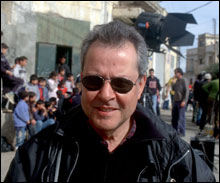 Watching the news lately, you can’t help thinking that nobody has an idea what’s going on in the Arab and Islamic world. Forget about Al- Qaeda — the riots in Paris, the intransigency of Iran, the electoral victory of Hamas, and the uproar over the Danish cartoons have left politicos and so-called experts scratching their heads. As those in “Intelligence” would put it, we’ve lost touch with “the street.”
Watching the news lately, you can’t help thinking that nobody has an idea what’s going on in the Arab and Islamic world. Forget about Al- Qaeda — the riots in Paris, the intransigency of Iran, the electoral victory of Hamas, and the uproar over the Danish cartoons have left politicos and so-called experts scratching their heads. As those in “Intelligence” would put it, we’ve lost touch with “the street.”
Not so the local filmmakers. Arab and Islamic cinema has flourished in the midst of this Western ignorance, with savvy, gifted directors making urgent art out of the lives of their people. Iran has long prospered on the screen, with Abbas Kiarostami, Jafar Panahi, and Mohsen Makhmalbaf illuminating a world far more complex and accessible than the stereotypes promoted by the Western media. (For how long remains to be seen given the country’s reactionary crackdown.) Palestine, too, has spawned intense new talents, notably Hany Abu-Assad, whose film about suicide bombers, Paradise Now, is up for a Best Foreign Language Film Oscar. And from Algeria, there’s Merzak Allouache, winner of this year’s Reba Stewart and Genevieve McMillan Award for distinguished filmmaking. He will be present at screenings of six of his films in a three-day retrospective, “Cinema from the Other World,” at the Harvard Film Archive.
Algeria? Even the French-born Algerian characters in Allouache’s films don’t know what’s going on there, or prefer to forget. Perhaps because all the slaughter and violence for the last 40 years has been mostly indigenous, Algeria has avoided the CNN spotlight, its trauma buried deep like the dirty secrets in Michael Haneke’s Caché.
Allouache doesn’t have the luxury of such amnesia. Born in Algiers in 1944, he came of age during the war of independence against French colonialism, the subject of Gillo Pontecorvo’s 1965 classic The Battle for Algiers. During a period of relative stability, Allouache was able to make his first film,
Omar Gatlato
(1976; February 26 at 7 pm; not available for preview). It was intimate look at the poor Bab El-Oued district of his home town, and its true-to-life characters and vérité style inspired a wave of similar filmmaking in his country.
But the Battle for Algiers, it seems, is never over. Anti-government riots broke out in 1988, and then civil war in the ’90s. Fundamentalist terrorists battled the military junta in charge, and civilians paid the price. To date some 70,000 have perished. Allouache, whose friend the novelist and journalist Tahar Djaout had been murdered by the rebels, returned to his old neighborhood to record the war’s genesis in
Bab el-Oued City
(1994; February 24 at 7 pm).
ADVERTISEMENT
 |
In style the film recalls Pontecorvo’s pseudo-documentary as well as Roberto Rossellini’s Città aperta|Open City. With violence erupting as he filmed, Allouache shot sometimes while in grave danger and often on the run. Employing a complicated but clear chronology, the film interweaves the lives of his characters with a serendipity that Paul Haggis’s Crash only simulates. And though they embody different aspects of Algerian life, these people are not stereotypes but fully observed and imagined human beings, pulsing with humor, pathos, and folly.
Like Boualem, a youth who works nights at a bakery and finds his attempts to sleep during the day frustrated by the loudspeaker outside his window. The Imam’s continual imprecations against the “filth” of the neighborhood streets drives him to a rash act. He pulls the speaker down and tosses it into the sea. Filled with remorse, he still can’t sleep. Said, the local Islamic bully, uses the theft as an excuse to crack down on local morals, targeting, among others, a woman who lives alone and drinks, her heart broken by the failure of the Marxist revolution in the ’60s and the loss of her lover. Meanwhile, Boualem falls in love with Said’s brutalized sister, Yamina.
The tension builds, and it all ends more or less badly. But far from being a tract, Bab El-Oued City at times plays like a comedy, particularly when Allouache turns his camera on the black-marketeers and smugglers who infiltrate everything and seem to keep the city running. Alilo in
Salut Cousin!
(1996; February 24 at 9 pm) aspires to that status, but when his cousin Mok greets him at a Paris train station, he’s frantic because he’s lost the address where he’s to pick up the bag of goods he has to sneak back to Algiers. Until his boss gets back to him with the information, Alilo can only cool his heels at his cousin’s place.